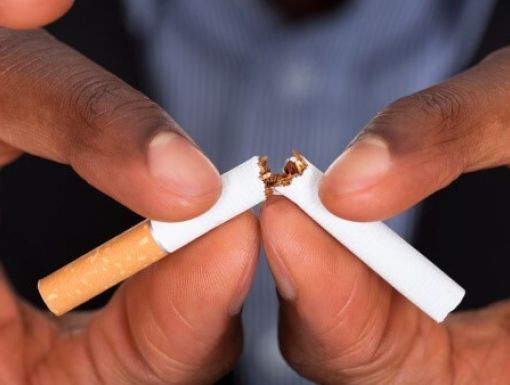
What Foods Can Help Smokers Quit?
Quitting smoking is no small feat. Smoking cessation often involves a mental and physical challenge, with nicotine withdrawal posing one of the biggest hurdles. Nicotine, the addictive substance in cigarettes, affects an estimated 80-90% of regular smokers, leaving lasting impacts on the body.
Beyond its addictive properties, nicotine depletes your body of essential vitamins and minerals. This can leave your body nutrient-deficient, resulting in fatigue, weakened immunity and other side effects. But here’s some encouraging news: the food you eat can help ease withdrawal symptoms, reduce cravings and repair the damage caused by smoking.
How can what you eat help you quit smoking?
When you decide to quit smoking, your body begins the healing process almost immediately. However, withdrawal symptoms like irritability, insomnia, increased appetite and a constant urge to smoke can feel overwhelming. Your eating habits can play an influential role in managing these challenges.
Proper nutrition serves three significant purposes during this time:
- Restoring nutrients: Replenishing depleted vitamins and minerals caused by smoking.
- Curbing cravings: Finding healthy substitutes for smoking-related behaviors, like hand-to-mouth motions.
- Regulating mood and energy: Maintaining stable blood sugar levels and reducing stress with the right foods.
What are the best foods and nutritional tips to make quitting smoking easier and more effective?
Here are science-backed nutritional tips and foods to help make your smoking cessation plan more effective:
1. Combat nicotine cravings with small, balanced meals: Nicotine serves as a stimulant, suppressing your appetite and causing sharp spikes and crashes in your blood sugar levels. Without nicotine, these fluctuations can leave you reaching for high-calorie snacks or overeating out of habit, especially in the early stages of quitting.
To counteract this:
- Try eating several small meals throughout the day instead of three large ones. This keeps your metabolism steady and prevents the temptation to binge
- Incorporate foods that release sugar slowly, such as whole wheat crackers, multi-grain bread, pears and natural yogurts. These foods help regulate blood sugar levels and fend off cravings
- Add protein to your meals, such as eggs, lean meats, nuts or legumes, to sustain energy and keep you feeling full longer.
2. Replenish vitamin C levels: Smoking is known to reduce supplies of vitamin C, an essential nutrient your body needs to strengthen immunity, reduce stress and maintain nervous system health. Replenishing this lost nutrient can helps you recover faster and supports your body in clearing out nicotine.
Vitamin C-rich foods to include in your diet:
- Fruits like oranges, kiwis, grapefruit and berries.
- Vegetables like broccoli, cauliflower and dark leafy greens.
Not only do these foods improve overall health, but they also reduce feelings of stress by lowering cortisol levels, a stress hormone often elevated during withdrawal.
3. Stay hydrated to flush out toxins: Water plays a critical role in eliminating nicotine from your system. Staying hydrated can speed up this detoxification process while also helping balance your appetite and reduce cravings.
Pro tip: Drinking a glass of cold water when a craving strikes can offer immediate relief by distracting you from the urge to smoke. Aim to consume at least 8-10 glasses of water daily.
4. Boost your mood with serotonin-enhancing foods: Withdrawal symptoms can sometimes take an emotional toll, leading to feelings of irritability, anxiety or even mild depression. Certain foods can help ease these symptoms by increasing serotonin, the “feel-good” hormone.
Foods rich in tryptophan (an essential amino acid) and vitamin B encourage serotonin production, easing stress while enhancing relaxation. Some options include:
- Dark chocolate is a comforting option that also contains magnesium to fight headaches and fatigue.
- Poultry, fish, eggs, nuts and beans are additional nutrient-dense options to maintain a stable mood.
5. Keep your hands and mouth busy: One of the hardest habits to break is the hand-to-mouth routine developed while smoking. Substituting cigarettes with healthy snacks can help ease this psychological trigger.
Here are some great options:
- Fresh fruits and vegetables like apple slices, carrot sticks, celery and cucumber. Bonus tip? Vegetables like eggplant leave a bitter aftertaste if consumed before smoking and may help reduce the appeal of cigarettes.
- Sugarless gum keeps your mouth engaged and combats cravings.
- Mixed nuts (like almonds, walnuts or pistachios) provide protein, energy and nutrients while keeping your hands busy
6. Enhance energy with whole grains: Increasing your physical activity is a proven method to combat nicotine cravings. To make the most out of your workouts, fuel your body with complex carbohydrates like whole-grain pasta, brown rice or quinoa. These foods sustain energy levels, ensuring you feel stronger and more motivated to stay active.
7. Use dairy to deter smoking: Interestingly, some studies suggest that consuming milk or yogurt before smoking may make cigarettes taste unpleasant. Incorporating more dairy into your diet could help reduce your desire to smoke, creating an additional line of defense during your quit process.
What are the best foods to add to your quit-smoking diet?
If you’re not sure where to start, here’s a quick roundup of superstar foods to incorporate into your plan: Fruits: Oranges, berries, kiwis and pomegranates.
- Vegetables: Broccoli, celery, cucumbers and leafy greens.
- Proteins: Lean meats, eggs, nuts, beans and fish.
- Grains: Whole-wheat bread, pasta and brown rice.
- Additional snacks: Sugarless gum, dark chocolate and mixed nuts.
Taking the first steps toward a tobacco-free you
Quitting smoking is undoubtedly challenging, but with the right support system, mindset and nutrition plan, it is entirely achievable. By focusing on foods that replenish nutrients, combat cravings and stabilize mood, you’ll give your body the tools it needs to recover and thrive.
Remember, quitting smoking is not a one-day event but a step-by-step process. Be patient, stay hydrated and keep your goals front and center. Ochsner Health’s free Smoking Cessation Program also offers the tools are resources from medical professionals to help start your quit smoking journey
Learn more about Smoking Cessation Services at Ochsner.



